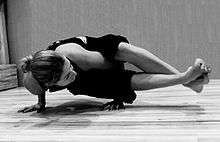Astavakrasana

Astavakrasana (Sanskrit: अष्टावक्रासन; IAST: Aṣṭāvakrāsana), Eight angled Pose,[1] or Astavakrasana is an asana.
Etymology
The pose is dedicated to the sage Astavakra, the spiritual guru of King Janaka. It is told that when the sage was in his mother's womb, his father Kagola made several mistakes while reciting the Vedas. Hearing these, the unborn sage laughed. The father became enraged and cursed his son to be born as Astavakra. So it came to pass that he was born crooked in eight places. These crooks earned him the name Ashtavakra or Eight Crooks. Yet Kagola was later defeated in a philosophical debate with Vandin, the court scholar. While still a boy the sage, a natural scholar of great ability went to court and avenged his father's defeat by beating Vandin in argument and becoming the guru of Janaka. Accordingly, his father blessed him and his deformity vanished.[2]
The name comes from the Sanskrit words asta meaning "eight", vakra meaning "bent, curved", and asana (आसन ) meaning "posture" or "seat".[3]
Description
Astavakrasana is a hand balance with lateral twist.[4]
Benefits
This difficult lateral movement tones the spine by supplying the spinal nerves with a copious supply of blood. It increases gastric activity and helps to digest food. The spine is given the maximum lateral twist.[5]
See also
References
- ↑ "Astavakrasana". Yoga Journal. Retrieved 2012-12-02.
- ↑ BKS Iyengar (1966). light on yoga. HarperCollins Publishers Limited. p. 276. Retrieved 2 December 2012.
- ↑ Kaminoff, Leslie (30 June 2007). Yoga Anatomy. Human Kinetics. p. 102. ISBN 1450419887. Retrieved 17 April 2013.
- ↑ "Astavakrasana - Eight angled pose". http://itsafablife.com. 25 July 2013. External link in
|journal=(help) - ↑ BKS Iyengar (1966). light on yoga. HarperCollins Publishers Limited. p. 277. Retrieved 2 December 2012.
Further reading
- Iyengar, B. K. S. (1 October 2005). Illustrated Light On Yoga. HarperCollins. ISBN 978-81-7223-606-9. Retrieved 2 December 2012.